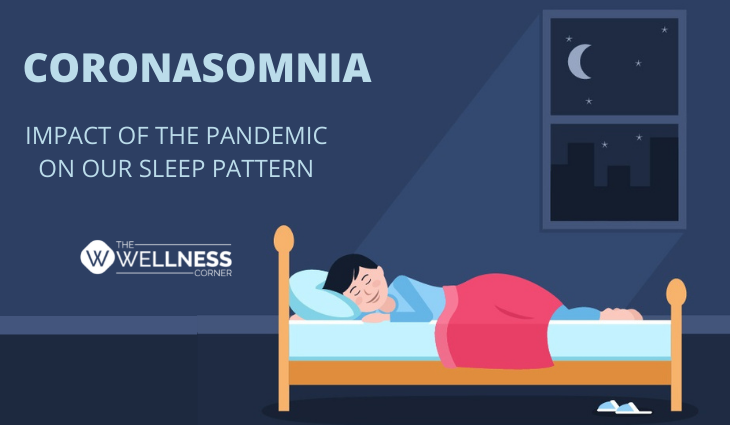We all agree that the pandemic has disturbed our sleeping patterns. Lack of good sleep is observed as a widespread issue during the coronavirus outbreak. With the grief, stress, anxiety, and COVID-19 impact on our regular life, people have reported sleep problems on a mass level. Due to the stress of living during this global pandemic, sleep experts have defined these sleep issues as portmanteau or coronasomnia (insomnia and coronavirus).
What Is Coronasomnia?
Coronasomnia is defined as an increase in sleep issues during the global pandemic followed by symptoms of depression, anxiety, and stress. While insomnia is related to depression and anxiety, coronasomnia varies from common insomnia due to its connection with the COVID-19 pandemic.
For many people, the coronasomnia symptoms began or intensified in the COVID-19 times. Also, among various causes including increase social media consumption, change in daily routine, are different as they seem fed up with:
- Financial stress
- Distance from others
- Emotional stress
- Professional concern
- Unpredictability
Who's Most Likely To Affected By Coronasomnia
According to health experts, anyone can grow the symptoms of coronasomnia, however, a certain type of people experiences the major risk on their health including:
- Frontline workers
- Patients with COVID-19
- Unpaid Caregivers
- Women
- Essential workers
- Young adults
Identify The Signs of Coronasomnia
You might have experienced the feeling of 'hitting a wall' currently when you find yourself sleeping most of the time after trouble sleeping and the stress of months. The signs of exhaustion (coronasomnia) may include:
- Insomnia symptoms including trouble falling asleep
- Increased level of stress
- Increased signs of depression and anxiety such as intrusive thoughts
- Delayed sleep patterns
- Sleep deprivation symptoms like daytime sleepiness, poor mood, focus, and impaired concentration.
As per the experts, people who are suffering from coronasomnia for a long period may experience a decrease in their mental health. This is obvious that the sleeping habits of people have changed during pandemic times. People tend to sleep more in the daytime than during the night.
How To Cope-Up With Coronasomnia
If you want to improve your sleeping pattern or avoid a severe condition of coronasomnia, here are some tips to get the rest you need;
- Sound Eating & Drinking: Add magnesium-rich greens seeds, nuts, avocados, cashews, or dark chocolate to your diet to enhance your sleep quality.
- Give Alcohol A Break: The myth that alcohol makes you sleep better is killing your sleeping pattern. Give yourself a break from alcohol to get a sound sleep.
- No Caffeine: Cut the caffeine intake as it causes sleep deprivation.
- Try A Weighted Blanket: They promote deep-touch pressure therapy, a tactic utilized to treat anxiety, sensory disorders, etc. without any side effects.
You can get sound sleep quality by bringing small changes in your daily sleep habits. Such as;
- Set limitation on electronic device usage.
- Pick a relaxing pre-sleep habit such as reading, listening to soft music, etc.
- Determine one hour before bedtime as your me-time
- Explore new coping techniques, support engagement or hobbies to minimize stress.
- Determine a daytime structure and try to go back to bed at a set time.
Bottom Line
Often overlooked, sleeping is an indispensable habit for an individual as lack of sleep can lead to more health risks. Chronic sleep deprivation can weaken the defense system of your body and make it more vulnerable to the virus. Consult with the doctors and therapists virtually if you think you might be experiencing the same symptoms with The Wellness Corner app. Maintain a healthy diet with a personalized diet plan to achieve wellness goals.
